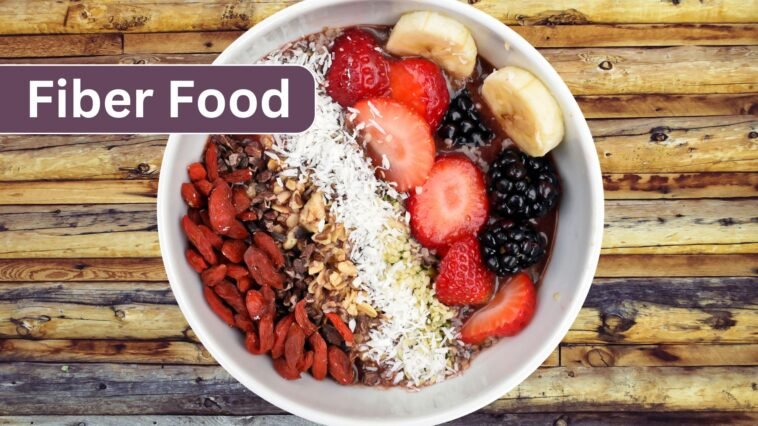Dietary fiber, often simply referred to as fiber, is a type of carbohydrate that plays a vital role in maintaining overall health. Unlike other carbohydrates, fiber isn’t fully digested by the body, which means it provides minimal energy. Despite this, fiber is crucial for a balanced diet and contributes significantly to various aspects of health, from heart disease prevention to weight management. This article explores the importance of fiber, its benefits, and practical ways to incorporate more fiber into your diet to optimize your well-being.
Understanding Dietary Fiber
Table of Contents
- Understanding Dietary Fiber
- What is Fiber?
- The Health Benefits of Fiber
- Recommended Fiber Intake
- High-Fiber Foods
- Tips for Increasing Fiber Intake
- Hydration and Gradual Increase
What is Fiber?
Fiber is a type of carbohydrate found in plant-based foods. Unlike sugars and starches, fiber cannot be broken down into sugar molecules. Instead, it passes through the digestive system largely intact. There are two main types of dietary fiber: soluble and insoluble. Both types play unique roles in health:
- Soluble Fiber: This type dissolves in water and forms a gel-like substance. It helps lower blood cholesterol and stabilize blood sugar levels. Found in foods like oats, apples, and beans, soluble fiber can aid in reducing the risk of heart disease and managing diabetes.
- Insoluble Fiber: This type does not dissolve in water and adds bulk to the stool. It helps promote regular bowel movements and prevents constipation. Foods rich in insoluble fiber include whole grains, nuts, and vegetables.
The Health Benefits of Fiber
1. Heart Disease Prevention
Fiber plays a key role in cardiovascular health. Soluble fiber, in particular, can help lower blood cholesterol levels by binding with cholesterol in the digestive tract and removing it from the body. This process reduces the amount of cholesterol that enters the bloodstream, thereby lowering the risk of heart disease. Incorporating fiber-rich foods like oats, beans, and fruits into your diet can contribute to a healthier heart.
2. Weight Management
One of the most significant benefits of fiber is its ability to aid in weight management. High-fiber foods are often lower in calories and take longer to digest, which helps you feel fuller for longer periods. This delayed digestion can help reduce overall calorie intake and prevent overeating. For example, adding fiber-rich foods such as whole grains, vegetables, and legumes to your meals can support weight control and promote a balanced diet.
3. Blood Sugar Control
For individuals with diabetes, managing blood sugar levels is crucial. Fiber, especially soluble fiber, can slow the absorption of sugar, leading to more stable blood sugar levels. By consuming fiber-rich foods like fruits, vegetables, and whole grains, you can help regulate blood sugar and improve overall diabetes management.
4. Digestive Health
Fiber is essential for maintaining digestive health. Insoluble fiber adds bulk to the stool, which helps facilitate regular bowel movements and prevent constipation. Additionally, fiber can promote a healthy gut microbiome by serving as a food source for beneficial bacteria. This can improve overall digestive function and contribute to a healthier digestive tract.
Recommended Fiber Intake
The recommended dietary fiber intake varies depending on age, sex, and calorie needs. Generally, it is advised to consume 14 grams of fiber for every 1,000 calories consumed daily. This translates to about 25 grams of fiber per day for women and 38 grams for men. Individual needs may vary based on specific health conditions and energy requirements.
High-Fiber Foods
1. Whole Grains
Whole grains are an excellent source of dietary fiber. Foods such as oatmeal, brown rice, quinoa, and whole wheat products are high in fiber and provide essential nutrients like B vitamins, iron, and magnesium. Incorporating whole grains into your diet can help increase fiber intake and support overall health.
2. Beans and Legumes
Beans and legumes are among the highest sources of dietary fiber. Lentils, chickpeas, black beans, and kidney beans offer substantial fiber content and are also rich in protein and essential minerals. Adding beans to salads, soups, and stews can significantly boost your fiber intake.
3. Fruits
Fruits are not only delicious but also packed with fiber. Apples, pears, raspberries, and bananas are excellent sources of fiber. Eating a variety of fruits can help you meet your daily fiber needs while also providing essential vitamins and antioxidants.
4. Vegetables
Vegetables are another important source of dietary fiber. Foods like Brussels sprouts, carrots, beets, and sweet potatoes provide substantial fiber content and are also rich in vitamins and minerals. Including a diverse range of vegetables in your diet can help enhance fiber intake and support overall health.
Tips for Increasing Fiber Intake
1. Incorporate Oats into Meals
Oats are a versatile and fiber-rich food. You can mix oats into meatloaf, bread, or other baked goods to boost fiber content. Additionally, oatmeal makes a great breakfast option and can be customized with various toppings like fruits, nuts, and seeds.
2. Add Beans to Dishes
Beans are a fantastic way to increase fiber intake. Toss beans into salads, soups, and stews for an added fiber boost. They also serve as a hearty and nutritious addition to various recipes.
3. Enhance Meals with Vegetables
Chop up vegetables and add them to sandwiches, pasta dishes, or stir-fries. This not only increases the fiber content of your meals but also adds flavor and nutrition.
4. Blend Fruits into Smoothies
Blending fruits into smoothies is an easy way to increase your fiber intake. You can also use fruit as a topping for cereal, pancakes, or desserts to add both flavor and fiber.
Hydration and Gradual Increase
When increasing fiber intake, it’s essential to drink plenty of water. Fiber absorbs water in the digestive tract, and adequate hydration helps facilitate smooth digestion and prevent potential issues such as bloating or constipation. Additionally, gradually increasing fiber intake allows your digestive system to adjust and prevents discomfort.
Bottom Line
Fiber is a crucial component of a healthy diet, offering numerous benefits for heart health, weight management, blood sugar control, and digestive function. By incorporating a variety of high-fiber foods such as whole grains, beans, fruits, and vegetables into your diet, you can support overall health and well-being. Remember to increase fiber intake gradually and stay hydrated to maximize the benefits of this essential nutrient. Embrace the power of fiber and make it a key part of your daily eating plan for a healthier, happier you



